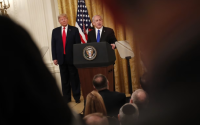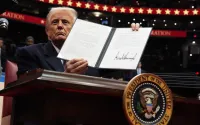22 June 2006The Independent
Gordon Brown has given his strong support to plans for renewing Britain's Trident independent nuclear weapons system, dealing a hefty blow to the campaign to halt the project.
The Chancellor threw his weight behind Tony Blair's plans to replace the submarine-based system when it is decommissioned in 2024. Replacement, opponents claim, could cost £25bn. Mr Brown will authorise the spending of £1bn a year between now and then.
Mr Brown used his Mansion House speech to the City last night to announce his personal commitment to keeping an independent deterrent. "In an insecure world we must and will always have the strength to take all necessary long-term decisions for stability and security," he said.
Promising to ensure "stability", he said: "The same strength of national purpose we will demonstrate in protecting our security in this Parliament and the long-term - strong in defence in fighting terrorism, upholding Nato, supporting our armed forces at home and abroad, and retaining our independent nuclear deterrent."
Allies said Mr Brown was ready to back the "full replacement" of Trident if military chiefs recommend that rather than a scaled-down version such as using air-launched cruise missiles. The fleet of four submarines, one of which is always on patrol, can be deployed flexibly and speedily, military officials say.
The Cabinet will take a decision in principle by the end of this year, with a public and parliamentary debate in the first few months of 2007 and a final decision next spring. With Mr Blair expected to stand down next year, it may coincide with the transition from a Blair to a Brown government. Although allies denied he was pre-empting the Government's decision, it will now be seen as inevitable.
The Chancellor's decision will also be seen as evidence that, despite tensions over the timing of Mr Blair's departure, he and Mr Blair can achieve a "stable and orderly transition". It is a deliberate signal to left-wing MPs and ultra-Blairites that he will not revert to Old Labour policies or duck tough decisions.
When The Independent disclosed during last year's general election campaign that Mr Blair had secretly decided to replace the ageing submarine fleet, Mr Brown declined to endorse him publicly. That raised hopes among Labour MPs and anti-nuclear campaigners that he might block Mr Blair's plans if, as expected, he succeeds him as Prime Minister.
Mr Brown has firmly dashed those hopes and provoked a furious reaction from opponents who claim the money would be better spent on public services. They claim the project will undermine efforts to rid the world of nuclear weapons, breach the Treaty on the Non-Proliferation of Nuclear Weapons and the British deterrent is not "independent" because it could not in practice be used without US backing.
Last night Gordon Prentice, Labour MP for Pendle, warned that Mr Brown's decision would cost him support in a now-inevitable Labour leadership election when Mr Blair stands down. "This means there will be no coronation, no shoo-in. I want to hear the views of the next Prime Minister on the big issues of the day. If you alienate enough constituencies of support, you are no longer the front-runner," he said.
Clare Short, a close ally of Mr Brown when she was in the Cabinet, said she would no longer support him in the leadership contest. "That is the end," she said. "There is no chance of uniting around Gordon Brown for a progressive consensus. This is Iraq-plus. It would continue the disastrous course and the mistakes and lock us into American foreign policy."
Some 93 Labour MPs have signed a Commons motion warning that a successor to Trident could cost as much as £25bn and calling on the Government to produce a Green Paper on all possible options. They also demand a House of Commons vote before any decisions are taken.
Yesterday, Mr Blair pointedly refused to guarantee such a vote. Opposition from Labour backbenchers could force Mr Blair and Mr Brown to rely on support from Tory MPs if Trident were put to a formal vote.
Hans Blix, the former United Nations chief weapons inspector, said this month that it would send a positive echo round the world if Britain, one of the original five nations with nuclear weapons, did not renew Trident. Privately, British ministers are reluctant to leave France as the only European nation that is equipped with nuclear weapons.
Who has them?
America: 5,735Russia: 5,830UK: 200France: 350China: 130India: 75 to 115Pakistan: 65 to 90North Korea: 0 to 7
Source: Bulletin of the Atomic Scientists






